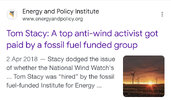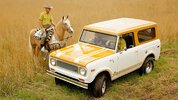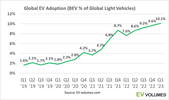- Joined
- 28 August 2022
- Posts
- 7,295
- Reactions
- 11,949
I remember some time ago the belief was that oil production had reached it's zenith and we were on a downward slope from there.I think many who discuss energy (in general, not specifically on ASF) forget that oil is the original problem needing to be solved.
Climate change and other environmental issues (nuclear waste, ash dumps, flooded valleys, killing the birds, whatever) are downsides of some of the alternatives to oil but in no way change that oil is the original problem needing to be fixed.
Because whilst nobody knows for absolute certain how much economically recoverable oil is on the planet, we do know that it's a reasonably limited resource relative to present consumption rates. If that wasn't the case then we wouldn't go to such extreme lengths to obtain it - there's nothing else we go into seriously deep water, to the north pole or into war zones to obtain like we do with oil and we do that simply because oil is sufficiently limited that we can't obtain enough by easier means.
In due course, as the most readily accessible and highest quality deposits are used up, obtaining oil is only going to get harder. Details about timing aside, that's inevitable by the very nature of it being a finite resource that we're consuming at the rate of 185,000 litres per second, every second of the day and night, every day of the year. Timing's hard to know but ultimately we can't keep that up indefinitely, at some point it gives out and the stuff's hard enough to obtain now to say that point is likely near enough to warrant at least some degree of concern and action regarding alternatives.
Whether or not EV's are the long term solution, conventional petrol and diesel clearly aren't.
The prices went up and the doomdayers were predicting the worst case scenarios.
As you so correctly say it is a finite resource and its day will eventually arrive.
Will the old sweat machine make an appearance as a mode of transport for short haul.
I just had a thought, the Toorak Tractors being replaced in the shopping centres wow.






